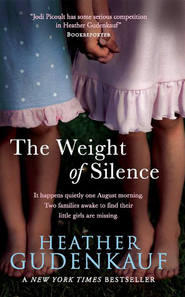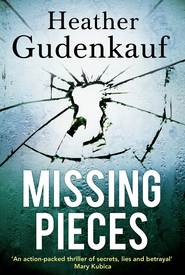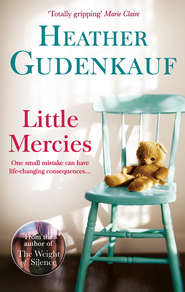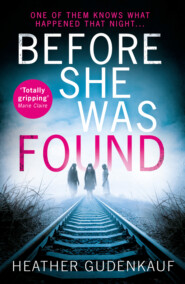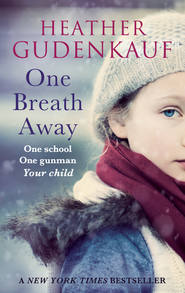По всем вопросам обращайтесь на: info@litportal.ru
(©) 2003-2025.
✖
These Things Hidden
Автор
Год написания книги
2018
Настройки чтения
Размер шрифта
Высота строк
Поля
“Sure,” I tell her as I grab my book bag from the backseat and make my way to the Animal Science building. “I work until nine. I’ll come right after.”
I met Missy the November after I moved to New Amery. I came to live with my grandmother in September. I was so sad and lonely; I spent the first two months in New Amery sitting in an extra bedroom in my grandmother’s house, crying and sketching in my journal, and trying not to kill myself. Finally, my grandmother had enough. She couldn’t stand to see me like that anymore.
“Come on, Brynn,” she said, coming into my room and sitting on my bed. “It’s time to get up and start living your life.” I peeked up at her from beneath my covers but didn’t answer. My grandmother was so different from my own father; at times I couldn’t believe she’d given birth to him. “I want to show you something,” she said, pulling the quilt off of me.
“What?” I asked grumpily. All I wanted to do was pull the blanket back over my head and sleep. Forget that I was such a failure, a loser, a no one.
“Come on, you’ll see,” she said, holding out her hand to help me up. My grandma herded me into her car and drove through the streets of New Amery until she pulled up in front of a long, squat metal building. Outside was a large sign, with the words New Amery Animal Shelter painted in bright red letters.
I sat up straighter in my seat and turned to my grandma. “Why are we here?”
“Come on, I’ll show you.” She smiled at me and I reluctantly followed her into the building. We were greeted by a friendly black lab and a girl my age wearing a red vest, with a name tag that said Missy. She was standing behind a tall counter holding a small orange kitten. I heard the muffled yips and whines of dogs being kenneled in another part of the building.
“Hello, ladies,” the girl said brightly. “What can I help you with today?”
My grandmother looked at me “What can she help you with today, Brynn?”
“Really?” I asked in disbelief. “Grandma, are you serious?”
“Go on and take a look.” She nodded her head toward the kennels. “There is some little critter in there, waiting for you Go find him.”
“Come on,” Missy said. “I’ll show you the way.” Missy opened a door and we were met with yelps and barking that echoed against the walls. The long, narrow room was lined with kennels filled with all kinds of dogs—a beagle, an English setter, labs and lots of mixed breeds. I stopped in front of a puff of reddish-brown fur that looked at me with bright, pleading eyes.
“What kind of dog is this?” I asked Missy.
“That’s Milo. He’s a mix of German shepherd and chow chow. Two months old. He was found out on a gravel road south of town. Poor thing was starving and dehydrated. He’s a busy little guy, but a sweetie.”
I looked at my grandma. “Can I have him?” I asked her, not daring to get my hopes up. He was only a few months old and already had huge paws, and Missy had said he was busy. “I think he needs me.”
“Of course, Brynn. He’s yours,” she said, sliding her arm around my waist.
It was through Missy that I became a volunteer at the animal shelter and learned about the Companion Animal program at the community college. I’m still not sure why pretty, fun-loving and free-spirited Missy befriended safe, boring me, but I’m glad she did. I remember when I was thirteen, my mother made me go to the same sleep-away soccer camp that Allison attended. I was terrible at soccer and screwed up every single time the ball came my way. Allison didn’t acknowledge me once that week. Whenever I tried to talk to her, whenever I tried to join in with her group of friends, she completely ignored me. When I finally couldn’t take it anymore and started blubbering like a baby, Allison rolled her eyes and laughed. I ended up spending the rest of camp in my cabin insisting that I sprained my ankle.
Having a friend, especially one who loves animals as much as I do, is such a relief. I drop my phone back into my purse and my hand grazes the bottle that holds the medicine I’ve been taking for the past year. I haven’t taken my dose for the day. Didn’t take it yesterday, either. I’ve been feeling better. Stronger. Even the news that Allison is out of jail doesn’t bother me as much as it would have a year ago.
Maybe it’s time to stop taking the pills. Maybe I’m ready to try things on my own for a while.
Allison
I look down at the baby doll, its lifeless eyes looking up at me, and I feel weak. It’s been five years and one month and twenty-six days. She would have been five years or sixty-one months or 269 weeks or 1,883 days or 45,192 hours or 2,711,520 minutes or 162,691,200 seconds old. I’ve been keeping count.
Many of the women at Cravenville had children. Some even gave birth to their babies behind bars. I used to run circle after circle around the prison courtyard, my tennis shoes pounding against the cement, the air heavy in my lungs. “Where you running to, Baby Killer? You running from yourself?” I would hear this from a corner of the yard and then a cackle of laughter. I ignored them. When they weren’t calling me baby killer or bitch or worse, they didn’t talk to me at all. They looked through me as if I was just a part of the putrid air on our cell block. Those were women who themselves were killers; they murdered their husbands or stabbed their boyfriends or shot a clerk in a robbery. But I’m worse. A helpless baby, a few minutes old, was tossed into the river to be swept away with the current, to be battered against the bank.
The women at Gertrude House are no different than the women at Cravenville. I have never felt more alone than I do right now. I know how hard it has been for my parents to witness how far I’ve fallen. But all I want is for them to come and see me. It’s been so long since I’ve held my mother’s hand, felt my father’s touch. Heard my sister’s giggle. We were never a touchy-feely family, but sometimes, when I hold very still, I can recall the weight of my father’s large, capable hand resting on my head. Sometimes, when I close my eyes, I can imagine that things are like they were before everything went wrong. I can imagine that I am back in high school, running on the track and trying to beat my best time, sitting in my room doing my calculus homework, helping my mom with dinner, talking with my sister.
I had a plan. I would ace my college entrance exams, play volleyball for the University of Iowa or Penn State, major in prelaw, go to law school. I had my future all mapped out. Now it’s gone. It’s over. All because of a boy and a pregnancy.
I was in the hospital, hooked up to an IV, when I first met Devin. She told me I was going to be charged with first-degree murder and child endangerment. “Did you think the baby was dead before she went into the river?” she asked me at that first meeting. I shrugged my shoulders and didn’t answer.
“Did you think she was dead?” she asked again, pacing back and forth in front of me. She was relentless. All I wanted to do was curl up in a ball and die and she kept trying to reexamine everything that had happened.
“Sure,” I finally said. “Sure, I thought it was dead.”
She spun on her heel. “Never call her an it. Do you understand?” she said severely. “You call her the baby or she or her, but never it. Got it?”
I nodded. “I really thought the baby was dead already,” I said, wanting to believe it, but knowing nothing I said was the truth. The medical examiner had already proved I was wrong.
Eventually, Devin had me plead guilty to involuntary manslaughter, a class “D” felony that carried a five-year sentence, and child endangerment, a class “B” felony that meant I could be confined for more than fifty years, although Devin assured me that there was no way I would serve that kind of time. I didn’t have to take the stand in my own defense. It never got that far. I’ve never told anyone what happened that night, and no one seems very interested in hearing the exact details. I think I remind everyone of someone they could know. A sister, a daughter, a grandchild. Maybe even themselves. Everyone knows the basics of what I did. That’s enough for them. Devin was right. I ended up being sentenced to ten years at Cravenville. As horrible as that sounded at the time, it was much better than the fifty-five years I could have faced. I asked Devin why it was such a short sentence.
“There are many factors,” Devin explained. “Prison overcrowding, the circumstances of the crime. Ten years is a bargain, Allison.”
Then, a month ago, Devin came to see me at the prison. I was running around the courtyard, the July heat radiating off the concrete. I could feel the warmth seeping into my tennis shoes and through my socks. Breathing heavily, I watched as Devin walked quickly over to me, dressed in the gray suit she wore like a uniform and high heels. I’ve never worn a pair of high heels, never went to a school dance, never went to the prom. “Allison, good news,” she told me by way of greeting. “The parole board is going to review your case. You’ll go before the board next week for an interview.”
“Parole?” I asked dumbfounded. “It’s only been five years, though.” I hadn’t dared to think about getting out earlier.
“With your good behavior and all the steps you’ve taken to improve yourself, you qualify for a parole hearing. Isn’t that great news?” she asked, looking questioningly at my worried face.
“It is good news,” I told her, mostly because it was what she wanted to hear. How could I explain to her that after getting used to the confinement, the horrible food, the brutality of prison, after coming to terms with how and why I got here in the first place, I actually found comfort there. For once in my life I didn’t need to be perfect. I didn’t need to plan for my future. It was all laid out for me in prison. Ten long years of just being.
“We need to sit down and talk about the kinds of things the members of the parole board will most likely ask you. The most important thing for you to do is to express remorse for what happened.”
“Remorse?” I asked.
“Remorse, regret,” Devin said tersely. “It’s crucial for you to say you’re sorry for what you did. If you don’t do that, there is no way they are going to grant you parole. Can you do that? Can you say you’re sorry you threw your newborn baby in a creek?” she asked me. “You are sorry, right?”
“Yes,” I finally said. “I can say I’m sorry.” And I did. I sat in front of the parole board as they reviewed my file. They complimented me on my good behavior while I was incarcerated, my work in the prison cafeteria, the fact that I earned my high school diploma and credits toward a college degree. They looked expectantly at me and waited. “I’m sorry,” I said. “I’m sorry I hurt my baby and I’m sorry she died. It was a mistake. A terrible mistake and I wish I could take it all back.”
My parents didn’t attend the hearing, and I worried their absence would make the parole board think that if my own parents wouldn’t even come to support me, there was no way they could recommend my release. But Devin told me not to worry; my grandmother was at the hearing and my chances of early release were excellent. “It’s all about what you’ve done to make things right while you were in prison. How you’ve tried to better yourself.” Devin was right. She always is. The parole board voted unanimously to release me.
I meet my roommate, Bea, a recovering heroin addict, at dinner. There are only five of us at the table. The rest of the residents are working or at approved activities. I want to know about the different jobs the women have gotten—I want so badly to start earning some money of my own—but I’m hesitant to ask or even speak. Everyone looks at me like I have the plague or something. Except for Bea, that is. She doesn’t seem to be bothered by my history. Either that or she hasn’t heard the sordid details yet. Bea has the thin, pocked face of an addict and hard black eyes that look like they’ve seen hell or worse. She also has thin strong arms that look like they could knock the crap out of any one of us, so everyone seems to give Bea her space. Not that violence of any sort is allowed at Gertrude House. Bea gleefully tells everyone about her first night at Gertrude House, anyway.
“Two ladies got in an argument over who got to use the phone next. There’s a sign-up sheet for a reason. This woman who had been in jail for embezzlement smacked the other gal across the face with the phone.” Bea laughs at the memory. “Blood and teeth flew everywhere. Remember that, Olene?” Bea asks as she stabs a green bean with her fork.
“I do,” Olene says wryly. “Not one of our finer moments here. We had to call the police.”
“Yeah, and because I was new to the house, I had to clean up all the blood and teeth.” Bea shivers at the memory.
“Oh, Bea,” Olene chides her gently. “I helped you.”
After dinner and helping with the dishes, I try to call my parents and then Brynn again. No one answers. I sit numbly on the sofa, the telephone in my hand, listening to the dial tone until Olene comes into the room, pulls the telephone gently from my hand and tells me I’m on my own until seven, when we meet as a group. I’m not surprised when I go up to my room and find another battered doll, headfirst in a tin bucket of water, there to greet me. I swallow hard and a solid knot of rage forms in my chest. How dare these women who themselves have done terrible, terrible things judge me? With a kick perfected my during my second year at soccer camp, my foot connects with the bucket, sending it clanking across the hardwood floor, water splashing and spreading in a puddle at my feet. I hear feet on the steps and snickers coming from the hallway and I turn swiftly and slam the bedroom door, the walls trembling with the force and echoing through the house.
After a few minutes there’s a knock at the door. “Go away,” I say angrily.
“Allison?” It’s Olene. “Are you okay?”
“I’m fine, I just want to be left alone,” I say more softly.
“Can I come in for a minute?” Olene asks. I want to say no, I want to climb out the window and run away, but I can’t go home and I can’t leave the area. “Allison, open the door, please.”






